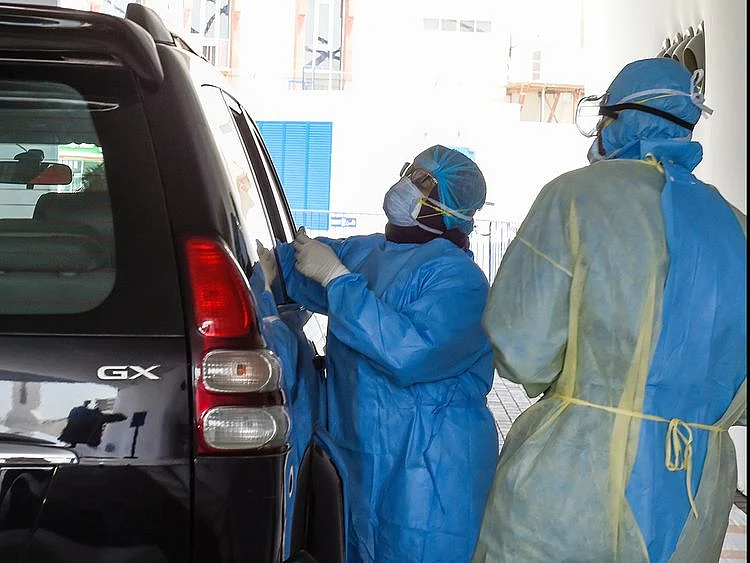Top 30 countries: Where the UAE stands in COVID-19 safety rankings
'Big data' comparison of Top 30 countries includes stability, safety and risk

Also In This Package
COVID-19 test: Thousands cram into stadium in Manila
Look which European leader wears the mask the best
Look how American schools plan for a September restart
Diners maintain social distancing with teddy bears
COVID-19: How Indians in UAE can apply for fine waiver
COVID-19: Tokyo Olympics depend on treatment
DUBAI: Which country is the safest in the world in the time of COVID-19? The United Arab Emirates has been named among the 10 safest places during the pandemic.
And the reasons are many.
A new comparative analysis of Top 30 leading countries was published by the Deep Knowledge Group on Thursday based on a number of "big data" metrics.
The group introduced a tool based on its “COVID-19 Regional Safety Assessment” in the form of a summary case study on the leading countries. The ranking used a quantifiable metrics system, which ranked the UAE at No. 10 out of the top 30.
Also Read
Eid Al Adha 2020: See how UAE residents get into the festive moodPhotos: Muslims around the world celebrate Eid Al AdhaIn Pictures: Scaled back Haj pilgrimage in Saudi ArabiaGulf News readers share pictures of beautiful mosques in UAEPhotos: How UAE residents celebrated Eid Al AdhaUAE: How to repatriate your domestic worker after visa expiresThe previous safety ranking and analytics published in June 2020 was limited to 20 countries.
New leaders
Deep Knowledge Group stated that the current case study, contained in a report published on July 30, 2020 also reveals new leading countries in terms of "change of performance", and "patterns associated with their positive shifts".
It is also accompanied by a visualised correlation of COVID-19 cases with such factors as the per cent of eldery population (human development index), obesity, tuberculosis and diabetes highlighted in the specific graphs.
“This update is the prototype of the forthcoming enhanced IT-Platform which will comprise the set of interactive dashboards powered by the most modern technologies in data-science and dynamic visualisation,” Deep Knowledge said in a statement.
The report noted a large number of regions prioritising economic recovery over public health and safety.
“Now that the nature of the pandemic is shifting, the task of identifying the most optimal balance between short-term economic recovery and longer-term preparation for a second wave of COVID-19 deserves a thorough and focused analysis.”
How the rankings work
The analysis utilises 130 quantitative and qualitative parameters, grouped into 30 indicators and 6 top-level categories:
33,000 data points
These categories were applied to 30 regions and utilised a total of 33,000 data points.
The ranking, the group explained, is “a composite index capable of comprehensively analyzing the health, societal and economic status of each region in terms of their absolute and relative stability, safety and risk.”
“Its aim is to enable responsible organisations and governments to learn from the strengths and weaknesses of their neighbours, and derive action-based answers and insights to key questions relevant for the national strategic decision-making process to optimise outcomes in the wake of the current global COVID-19 pandemic and decrease the impact of future negative aftermath,” it added.
Those who follow the analytics rankings of Deep Knowledge Group will likely be interested to know which countries have improved their performance dramatically since the previous iteration.
UAE, Saudi Arabia
UAE and Saudi Arabia improved their positions, the report noted.
Those countries, whose rating remained not only high but also completely stable, were the long-term leader: Switzerland (1st), Germany (4th), Japan (5th) place, whereas New Zealand and South Korea significantly improved their positions and retained 2nd and 3d places.
The list of Top-30 safest regions also features 10 new territories present on the list for the first time, which have seen significant positive changes in performance in recent weeks.
“The decision to expand the top list seems justified especially given the growing effect of the second wave of the pandemic on the one hand, and changes in COVID-19 policies (both positive and negative) among previous leaders,” Deep Knowledge Group stated.
However, the biggest changes occurred in the last 10 positions (from 21s t to 30th) where one can surprisingly observe those countries, which in the last years were barely treated as world leaders i n the common categories, which are out of date since recently.
“It appears that the parameters relating to the COVID-19 prevention and treatment are now in a one row with the GDP, resilience capabilities and financial markets indicators, although the l ist of the l eading states might differ almost completely when it comes to the national healthcare efficiency and nowadays safety, as revealed by the Deep Knowledge Group.
Deep Knowledge Group said their COVID-19 analytics is built upon the "synthesis, repurposing and extension of a number of key specific special case studies conducted by a variety of its analytical subsidiaries".
Deep Knowledge Group is an international consortium of commercial and non-profit organisations focused on the convergence of "deeptech" and frontier technologies (AI, Longevity, MedTech, FinTech, GovTech), applying progressive data-driven solutions.
It aims to achieve positive impact through the support of progressive technologies for the benefit of humanity via scientific research, investment, entrepreneurship, analytics and philanthropy.
Sign up for the Daily Briefing
Get the latest news and updates straight to your inbox
Network Links
GN StoreDownload our app
© Al Nisr Publishing LLC 2025. All rights reserved.